Complete Solutions to Locomotion And Movement of chapter LOCOMOTION AND MOVEMENT of Class 11 book with complete answers and questions
| Class 11 | BIOLOGY |
| Chapter | LOCOMOTION AND MOVEMENT |
| NCERT FINGERTIPS | Locomotion And Movement |
| Number Of Questions | 100 |
| Academic Year | 2023-24 |
Read the following statements and select the correct option.
Statement 1: Locomotion is the movement of an indvidual from one place to another.
Statement 2: All movents are locomotions are but all locomotions are not movements .
View SolutionMicrofilaments are involed in
View SolutionThe amoeboid movement results from
View SolutionPassage of ova through female reproductive tract is facilitated by
View SolutionMatch coloum I with coloum II select the correct option from the codes given below.

View SolutionThe type of muscle present in our
View SolutionWhich of the following is the most abundant mineral element in the skeletal muscle ?
View SolutionThe type of muscle fibre present in the wall of alimenatry canal is
(I)Cardiac fibres are branched with one or more nuclei.
(II) smooth mucles are unbranched and cylindrical.
(III) Skeletal muscles can be branched or unbranched.
(IV) Smooth muscles are non-striated.
View SolutionRead the following statements carefully and select the correct ones.
Cardiac fibres are branched with one or more nuclei.
(ii) Smooth muscles are unbranched and cylindrical.
(iii) Skeletal muscle can be branched or unbranched.
(iv) Smooth muscle are non-striated.
View SolutionWhich of the following statements is incorrect ?
View SolutionDark bands are
View SolutionWhat is sarcomere ?
View SolutionThe functional unit of contractile system in a striated muscle is
View SolutionGiven below is the figure of a sarcomere. Identify the parts labelled as A to D and select the correct option.
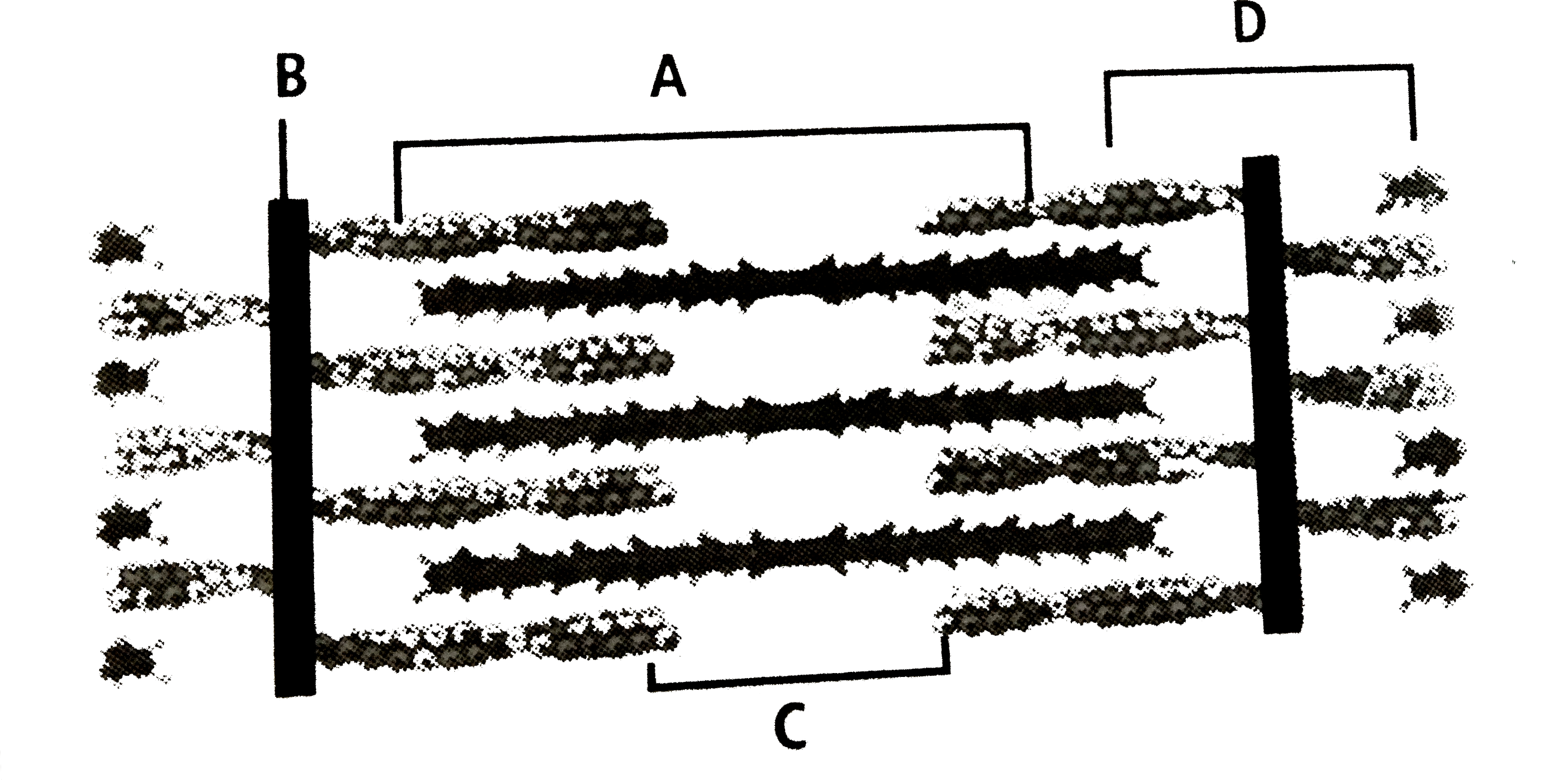
View SolutionWhich of the following statements about the striated muscle is incorrect
View SolutionWhich of the following sarcomeres is labelled correctly ?
View SolutionThe given figure represents the histology of of a striated muscle. Identify the parts labelled as A, B, C and D, and select the correct option.
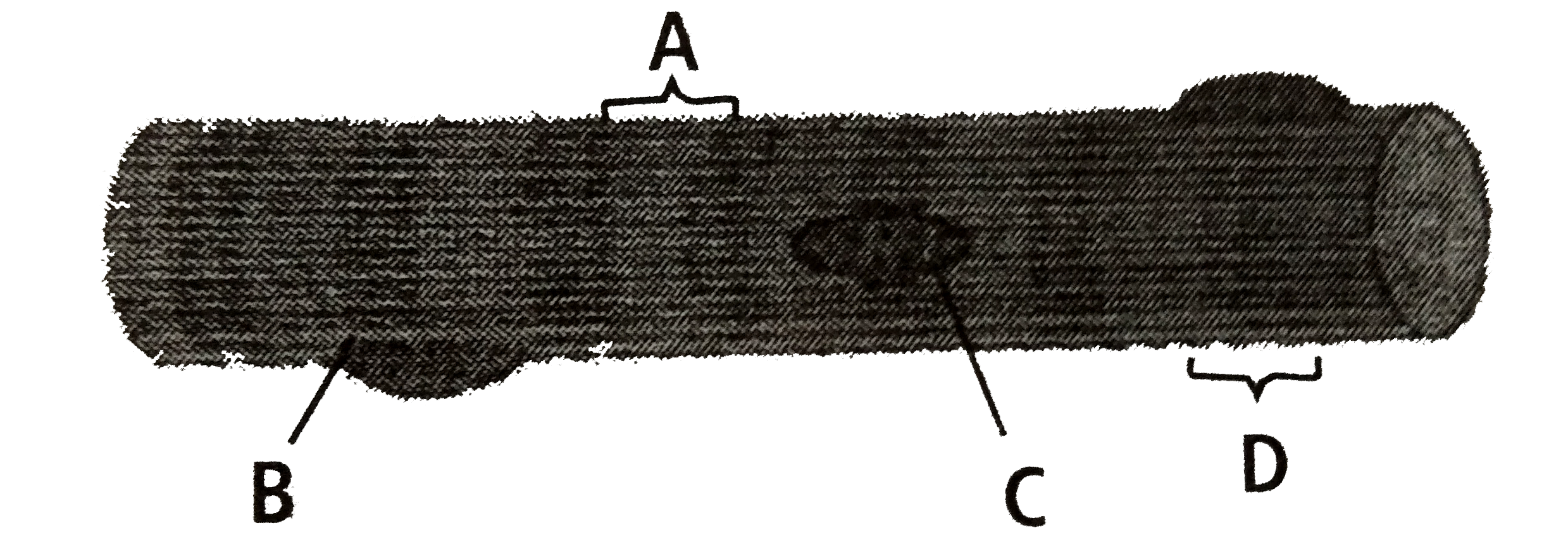
View SolutionMatch coloum I with coloum II and select the correct option from the codes given below.
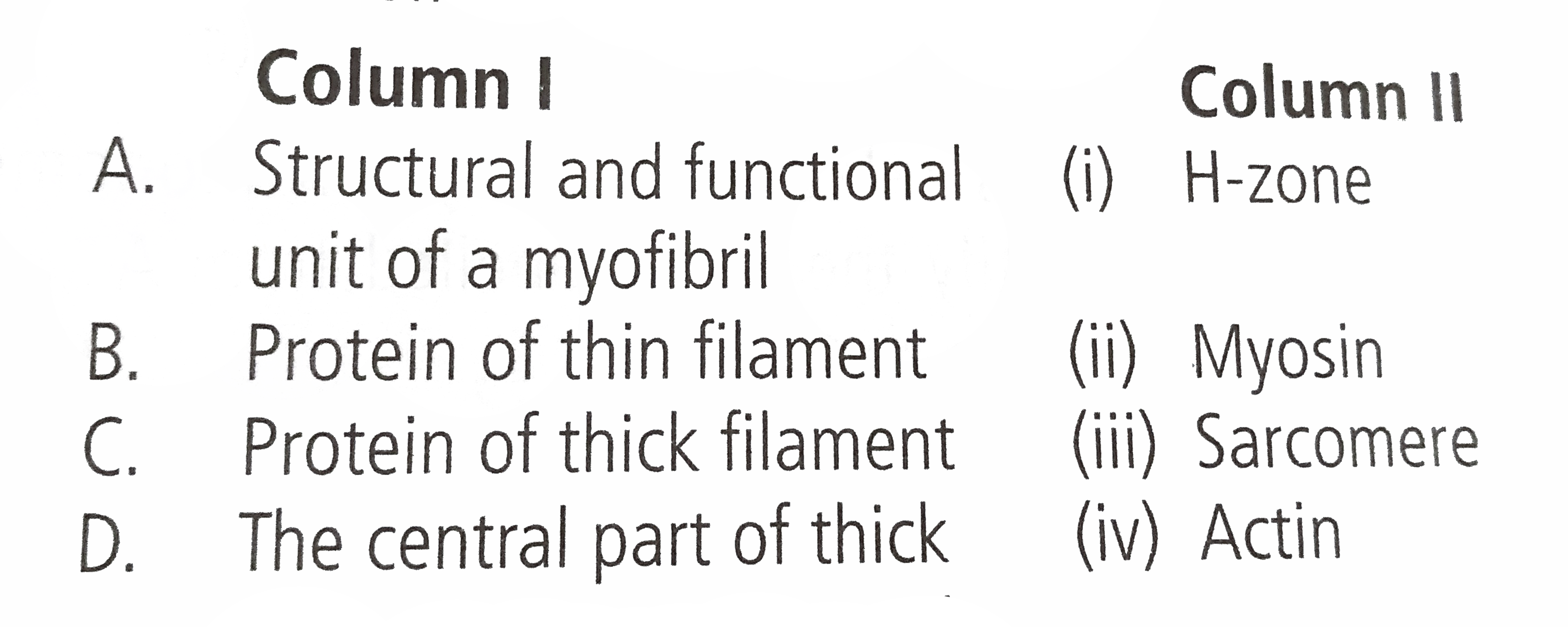
View SolutionRead the given statements and select the correct option.
Statement 1: A primary myofilament is composed of a bundle of rod-like molecules of a protein myosin.
Statement 2: Myosin and actin together a form a contractile apparatus.
View SolutionWhich of the following contractile proteins contributes 55% of muscle protein by weight?
View SolutionThe given figure shows an actin (thin) filament. Identify the labelled parts A, B, and C and select the correct option.

View SolutionFill up the blanks in the following sentence by selecting the correct option.
View SolutionActin binding sites are located on
View SolutionThe given figure is related with myosin monomer (meromyosis). Identify the parts labelled from A to C and select the correct option .
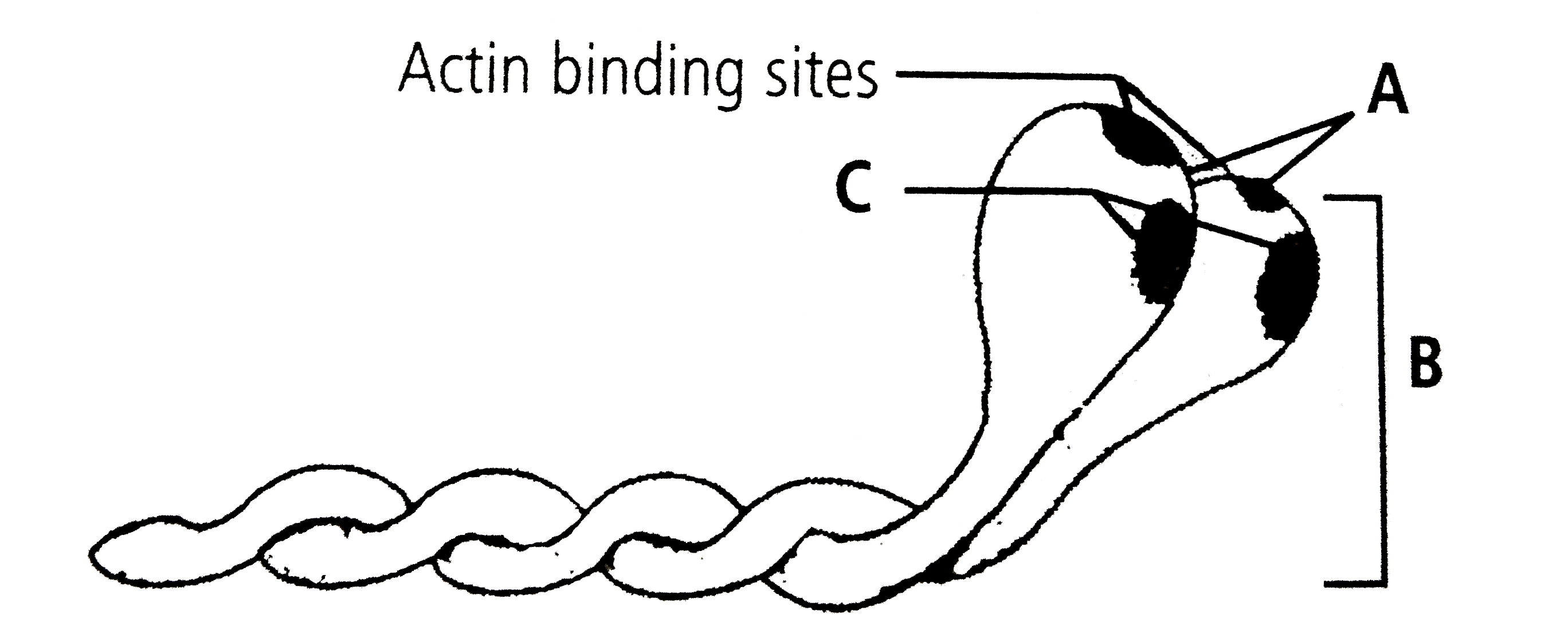
View SolutionWhich of the following statements are correct regarding muscle proteins ?
(i) Actin is a thin filament and is mde up to two F-actin
(ii) The complex protein, tropomyosin is distributed at regular intervals on the troponin
(iii) Myosin is a thick filament which is also a polymerised protein.
(iv) The globular head of meromyosin consists of light meromyosin (LMM).
View SolutionWhich of the following statements about the molecular arrangement of actin and mysin In myofibre is/are incorrect ?
(i) Each actin (thin filament) is made of 2F (filamentous) actins.
(ii) F-actin is the polymer of G (globular) actin.
(iii) 2F0actins are twisted into a helix.
(iv) Two strands of tropomyosin (protein) lie in the grooves of F-actin.
(v) Troponin molecules (complex proteins) are distributed at regular intervals on the tropomyosin.
(vi) Troponin forms the head of the myosin molecule.
(vii) The myosin is a polymerised protein.
View SolutionWhich one of the following options shows the next stage of muscle contraction after the stage given in question ?
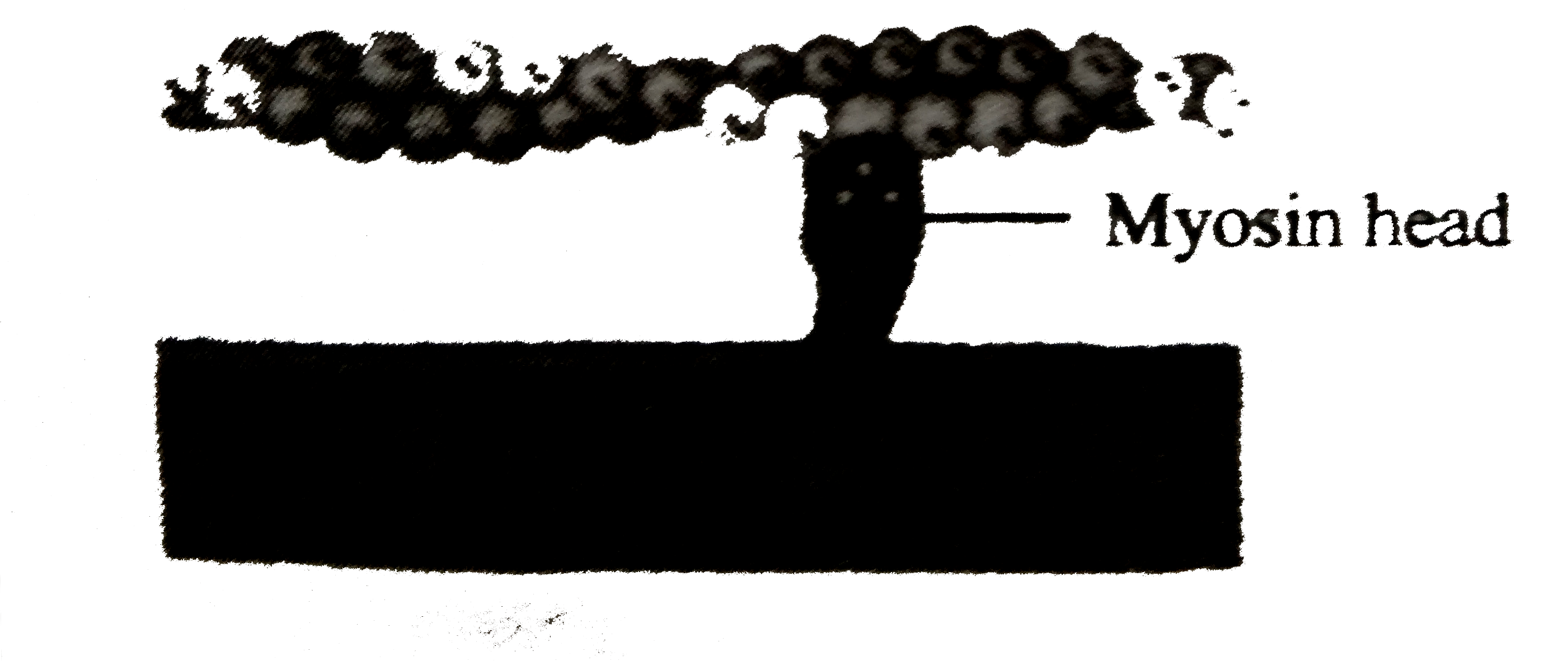
View SolutionDuring muscular contraction, which of the following events occur?
(i) H-zone disappears
(ii) A-band widens
(iii) I-band reduces in width
(iv) Width of A-is unaffected
(v) M-line and Z-lne come closer
(v) M-line and Z-line come closer
View SolutionThe figures given here repesent three diferent conditions of sarcomeres. Identify these conditions and select the correct option
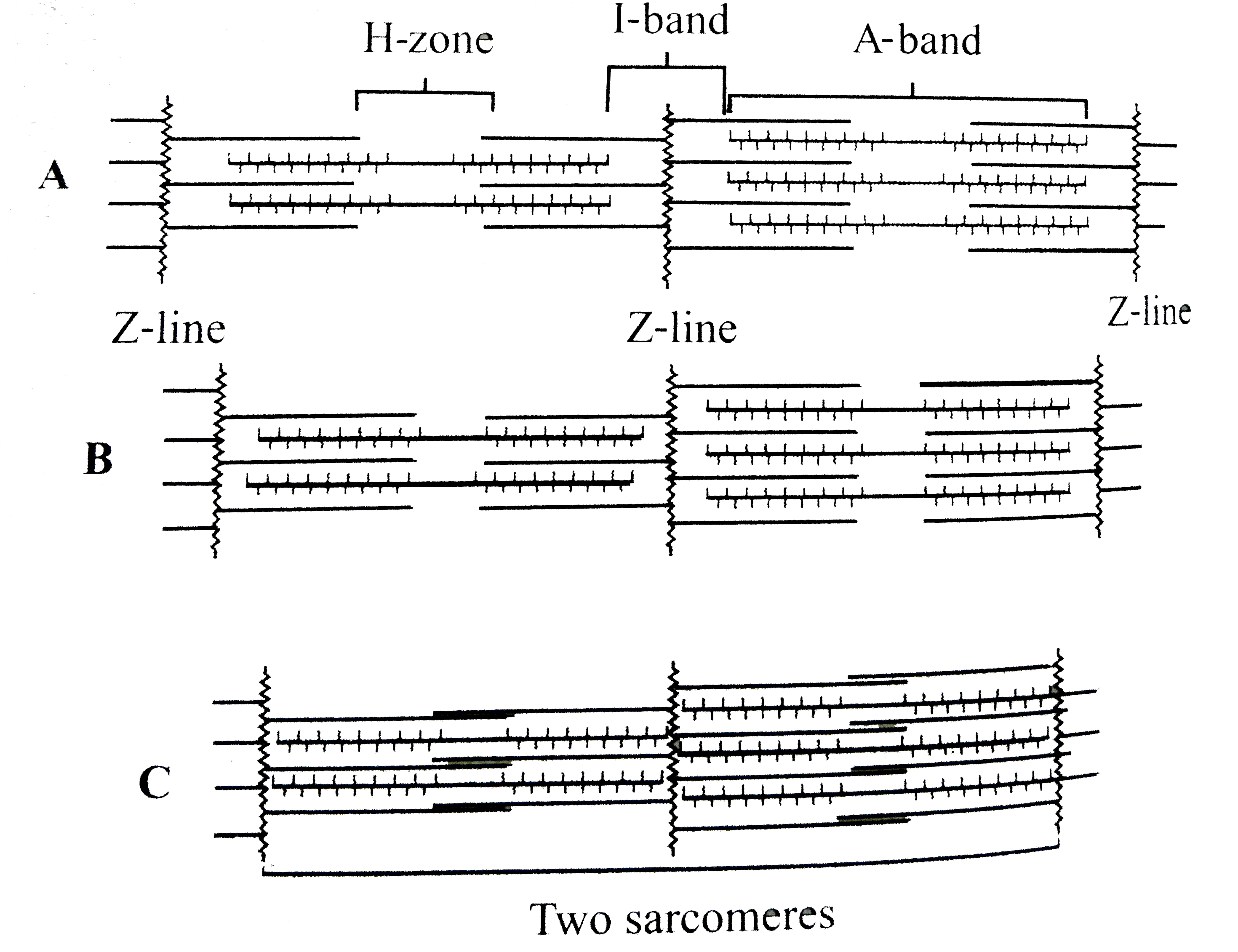
View SolutionFollowing is given a randomly arranged list of events that occur at neuromuscluar junction to trigger mucle contraction.
(i) Receptor sites on sarcolemma
Nerve impulse
(iii) Release of `Ca^(+2)` from sarcoplasmic reticulum
(iv) The neurotransmitter acetylcholine is released
(v) Sarcomere shorten (vi) Synaptic cleft
(vii) Spread of impulses over sarcolemmna on T-tubules Which of the following gives the correct sequence of these steps?
View SolutionWhich of the following is correct regarding changes in muscle fibre from relaxed to contracted state in the given figure ?

View SolutionIn a muscle undergoes rapid contraction and relaxation, the sarcoplasmic reticulum extension
View SolutionConsider the following statements each with one or two blanks.
(i) Repeated activation of the muscle can lead to the accumulation of (A) due to anaerobic breakdown of glycogen in them, causing fatigue.
(ii) The globular head of meromyosin is an active ATPase enzyme and has binding sites for (B) active sites for (C) .
This centre part of thick filament, not overlapped by thin filaments is called the (D) .
Which one of the following options correctly fils the concerned blanks ?
View SolutionWhich of the following statements about the mechanism of muscle contraction are correct ?
(i) Acetylcholine is released when the neural signal reaches the motor end plate.
Muscle contraction is initiated by a signal sent by CNS via sensory neuron.
(iii) During muscle contraction, isotropic band gets elongated (iv) Repeated activation of the muscles can lead to lactic acid accumulation.
View SolutionThe slow twitch muscle fibre which are rich in myoglobin and have abundant mitochondria are
View SolutionIdentify from the following list, the characteristics of red muscles (A) and white muscles (B) and select the option that correctly segregates the characters.
(i) Less number of mitochondria
(ii) More number of mitochondria
(iii) Sarcoplasimic reticulum is abundant (iv) Myolobin content high
(v) Sarcoplamic reticulum moderate
(vi) Aerobic muscles
(vii) Depend on anaerobic respiration for energy
(viii) Less myoglobin content
View SolutionMyoglobin is present in
View SolutionWhich of the following is a source of energy for muscle contraction ?
View SolutionThe protien whose removal enables myosin to bind actin in smooth muscle is
View SolutionDuring muscle contraction, actin and myosin ffrom
View SolutionWhich of the following ions help in muscle contraction ?
View SolutionIf a stimulus, several times greater than the threshold stimulus, is provided to a muscle fibre, it will
View SolutionWhich of the following is incorrect regarding muscle contraction?
View SolutionUpon stimulation of skeletal muscles, calcium is immediately made available for binding to troponin from
View SolutionIn the resting muscle fibre, tropomysin partially covers
View SolutionEnds of long bones are covered with
View SolutionExamine the given diagrammatic view of human skull given below and identify the skull bones labelled from A-D.
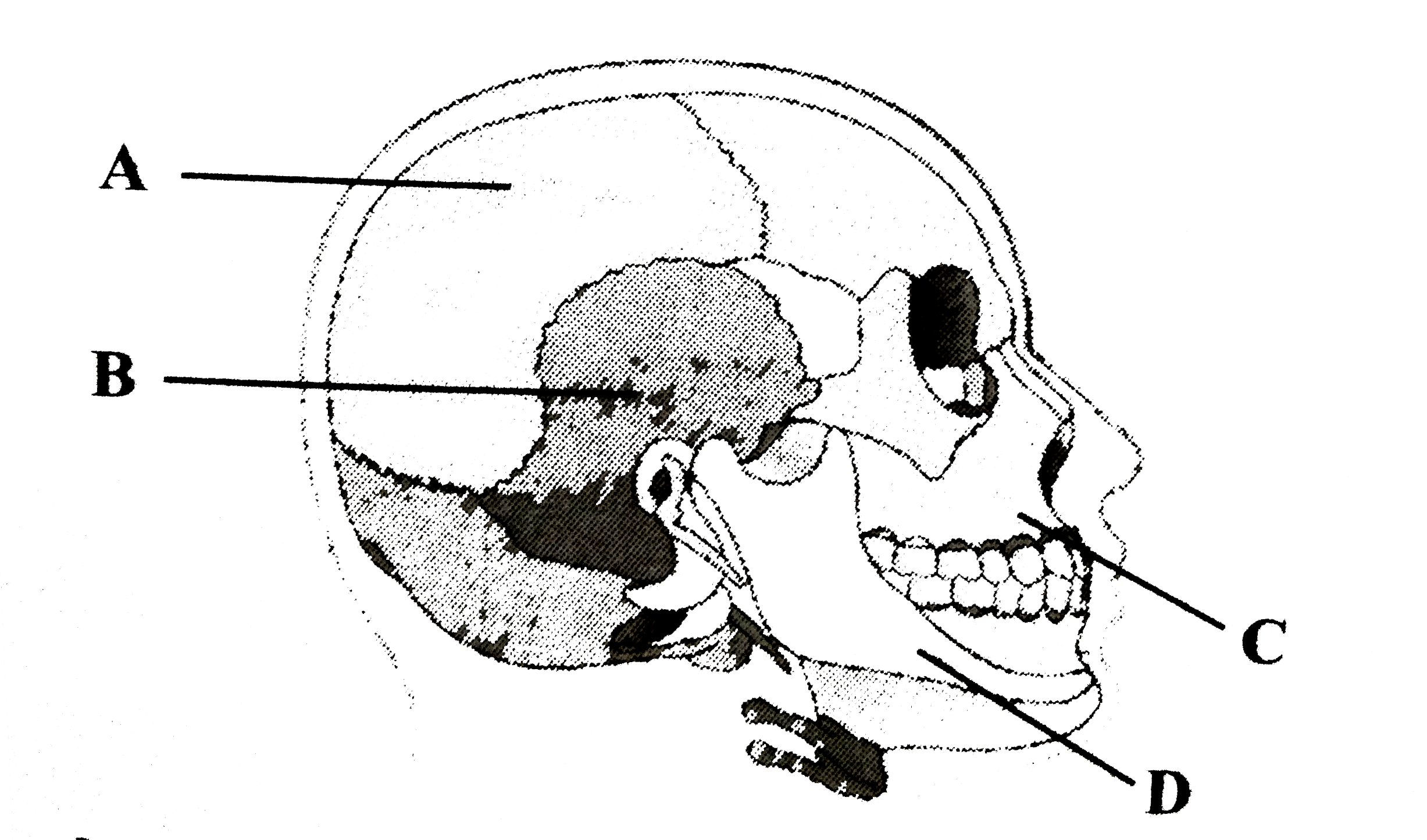
View SolutionWhich of the following is a bone of skull?
View SolutionCranium of human contains
View SolutionHow many bones form the skeleton of the face ?
View SolutionIn an adult human, how many bones are present as ear ossicles ?
View SolutionSmallest bone in human system is
View SolutionSkull of man is
View SolutionIdentify the parts labelled as A to E in the given figure of a vertebral column and select the correct option.
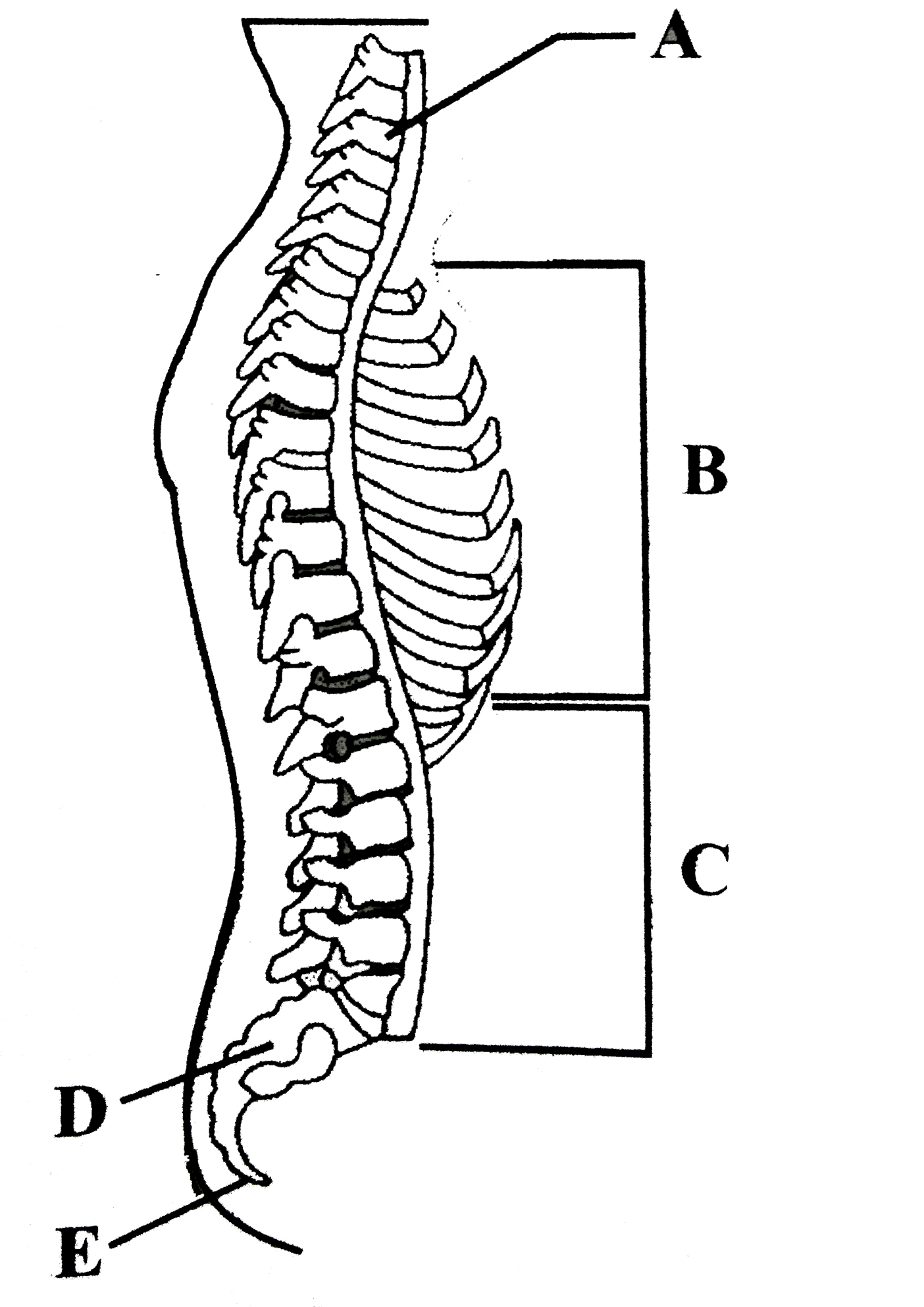
View SolutionNumber of cervical vertebrae in most mammals is
View SolutionThe cervical vertebra called axis provids head with sideways rotation. This can be because
View SolutionLumbar vertebrae are found in
View SolutionThe vertebral column is connected to the pelvic girdle in the
View SolutionHuman vertebral column consists of 33 vertebrae and ____________bones.
View SolutionWhich of the following vertebra is formed from four vertebrae ?
View SolutionWhich of the folowing is not a function of vertebral column ?
View SolutionConsider the following four statements (i)-(iv) and select the correct option.
(i) Actin is present in thin filament.
(ii) H-zone of striated muscle fibre represents both thick and thin filaments.
(iii) There are 11 pairs of ribs in man.
(iv) Sternum is present on ventral side of the body.
View Solution`11^(th)` and `12^(th)` pair of ribs which are imperfectly formed and do not reach the sternum are called
View SolutionMatch column I with column II and select the correct option from the codes given below.
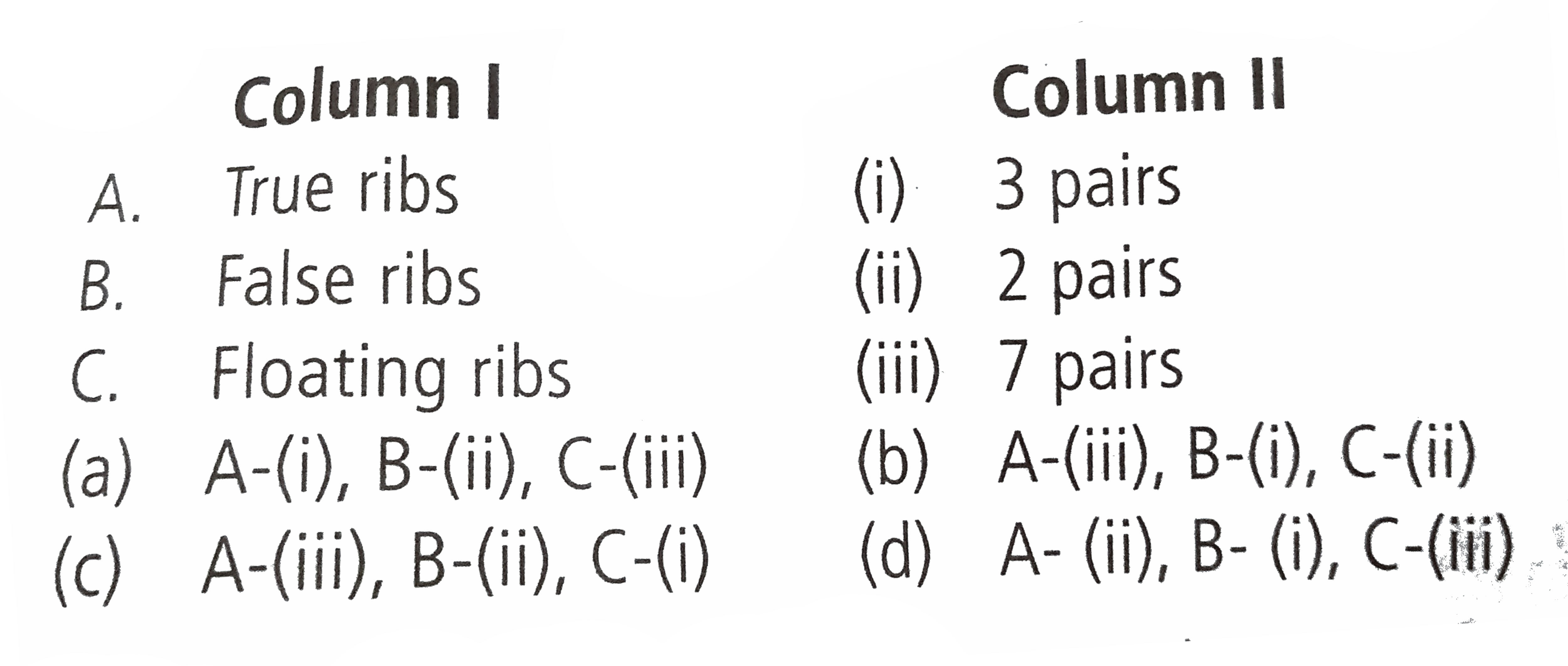
View SolutionThe figure given here is of rib cage. Identify the parts labelled as A, B and C and select the correct option .
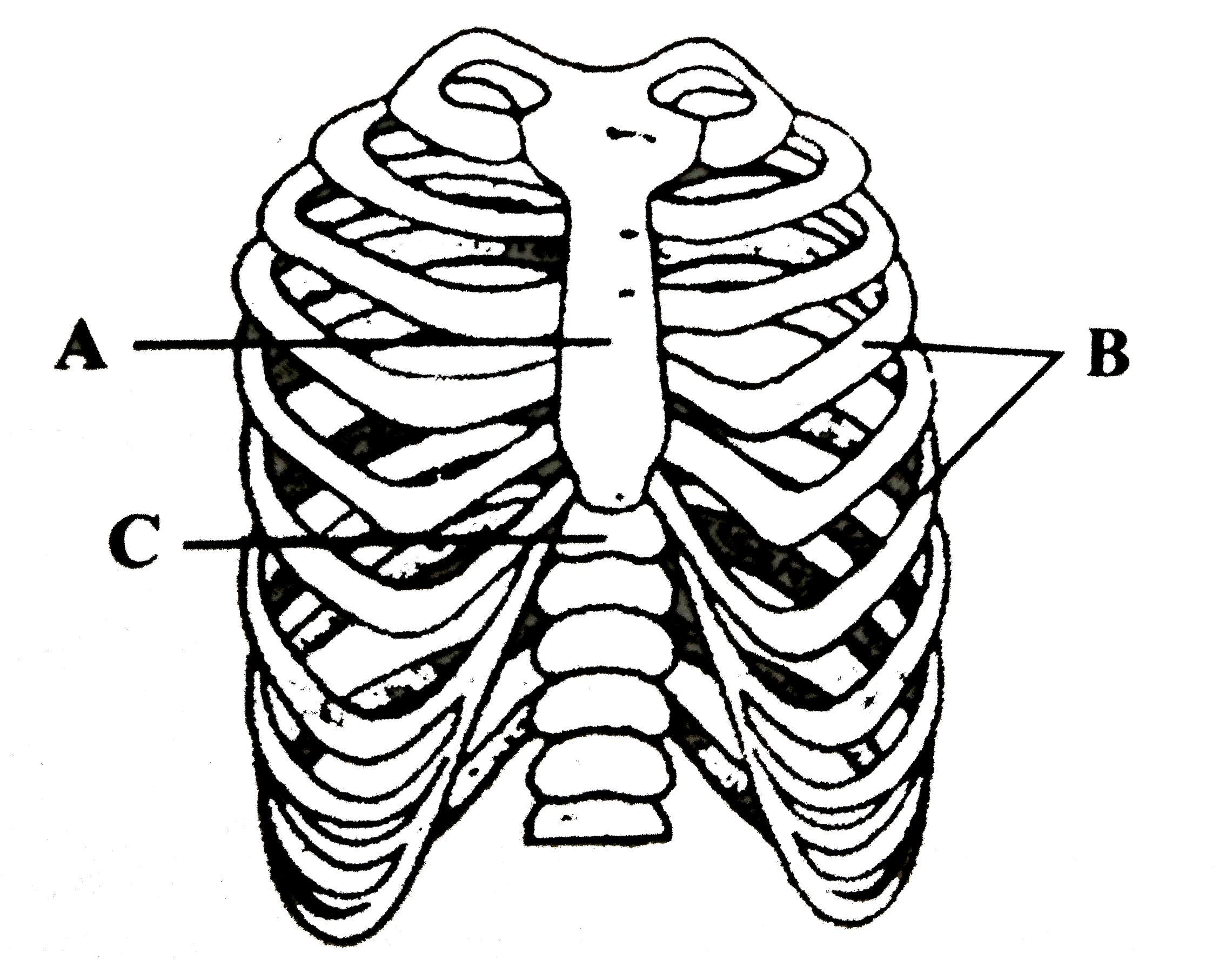
View SolutionThe scapula is a large triangular flat bone situated in the dorsal part of the thorax between
View SolutionAppendicular skeleton includes
View SolutionTotal number of bones in the hindlimb of a man is
View SolutionMatch column I with column II and select the correct option from the codes given below.
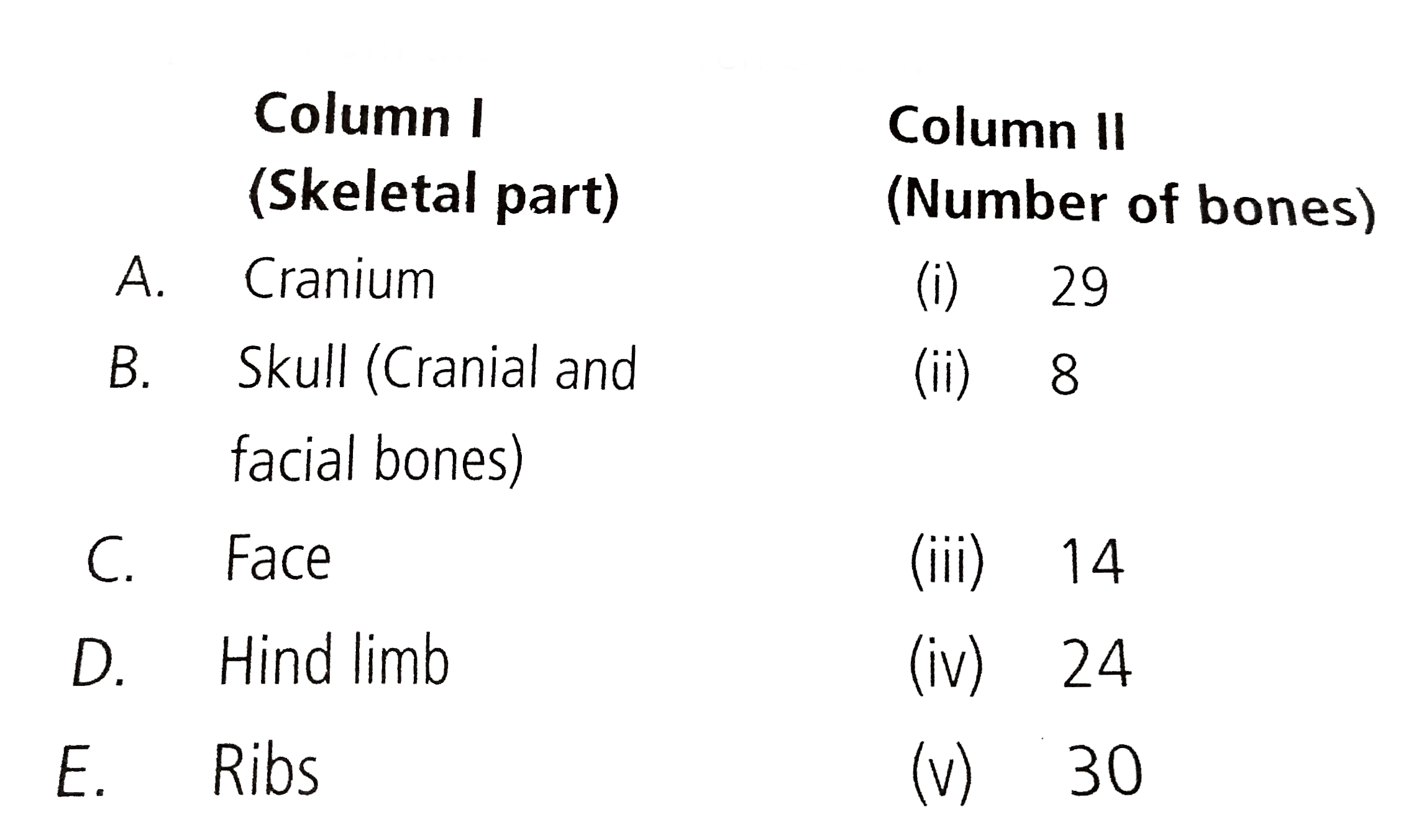
View SolutionStudy the following flowchart and fill up the blanks by selecting the correct option.
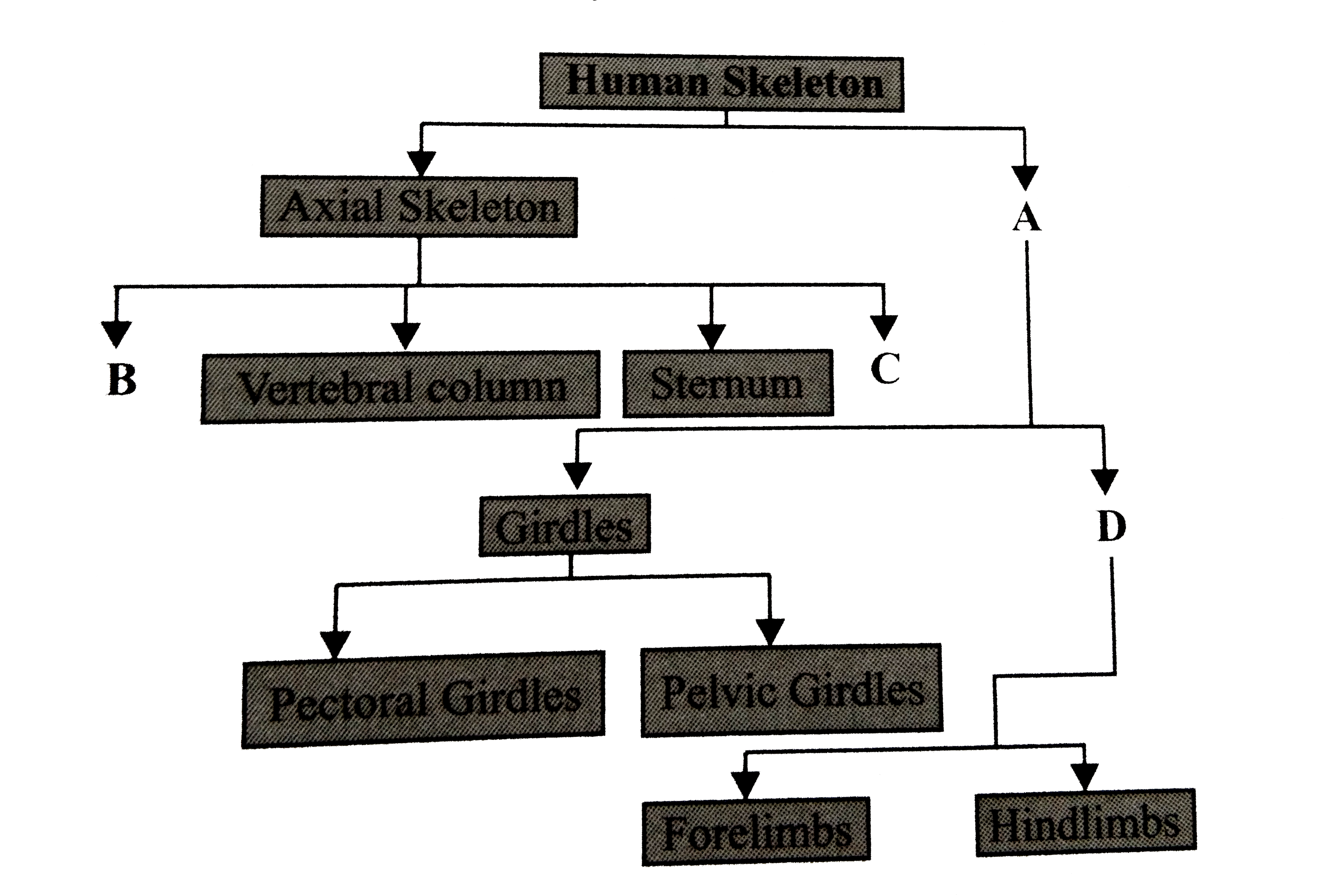
View SolutionExamine the figure of pectoral girdle and forelimb and identify the parts labelled as A, B, C and D.
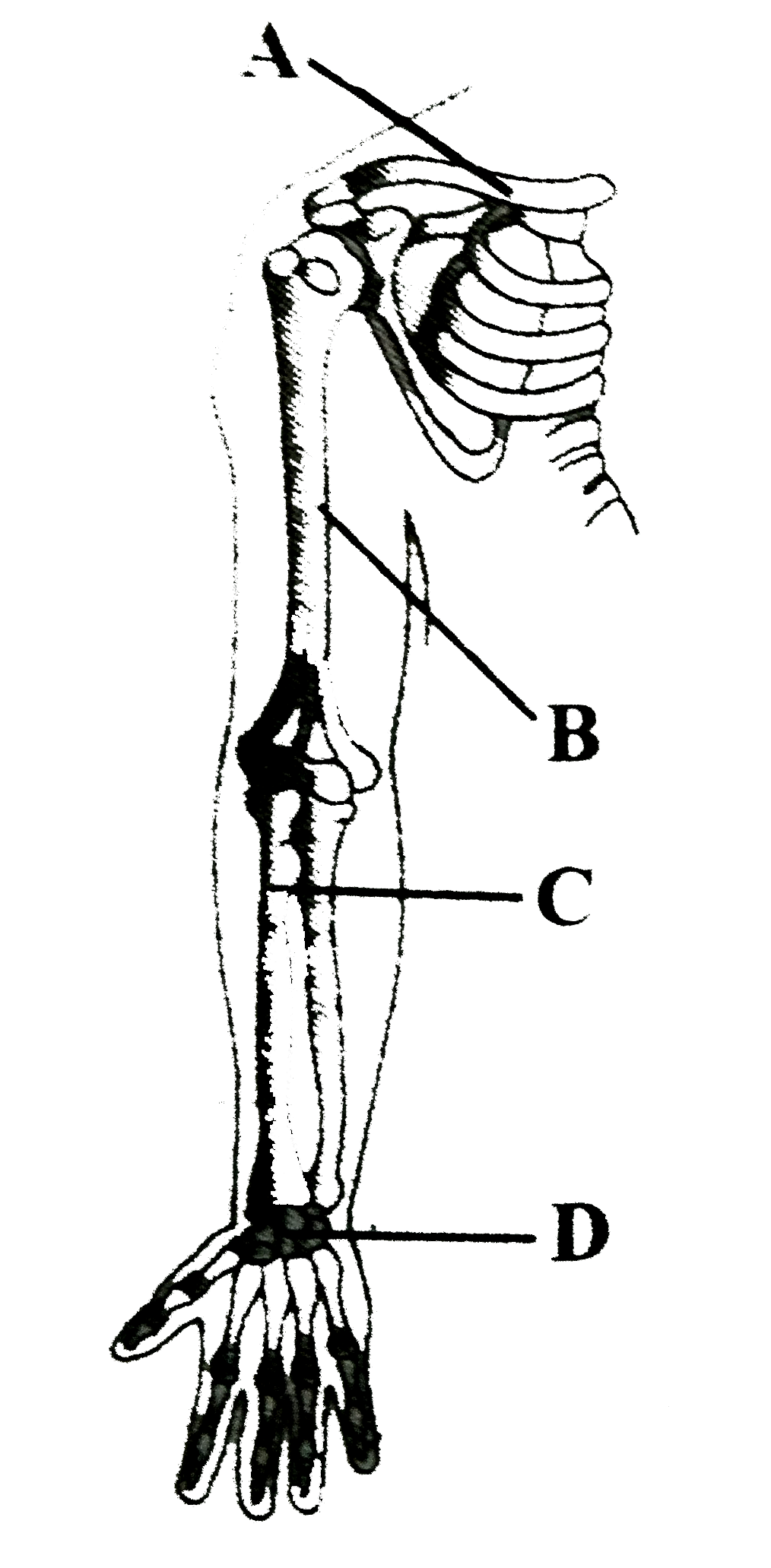
View SolutionWhich of the following bones form a link between axial and appendicular skeleton ?
View SolutionWatch column I with column II and select the correct option from the codes given below.
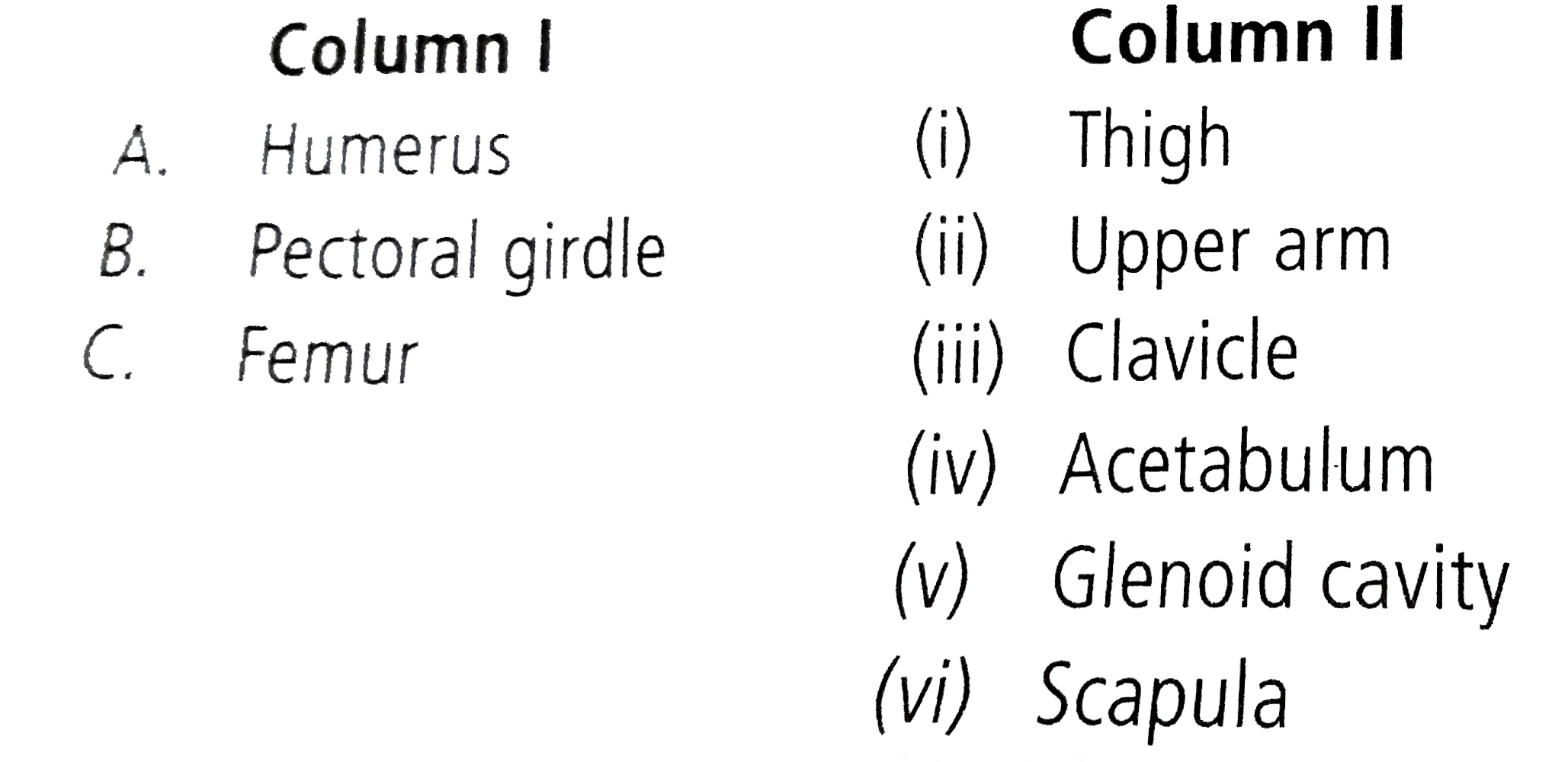
View SolutionHumerus with its rounded upper end (head) articulates into
View SolutionAcromion process is characteristacally found in the_______________of mammals.
View SolutionWhich of the following components is a part of the pectrol girdle ?
View SolutionThe shoulder blade is made of
View SolutionIdentify the incorrectly matched pair.
View SolutionCollar bone is known as
View SolutionAcetabulum is located in
View SolutionThe figure Is showing part of right pelvic girdle and lower limb nones. Identify the parts labelled as A to E and select the correct option.
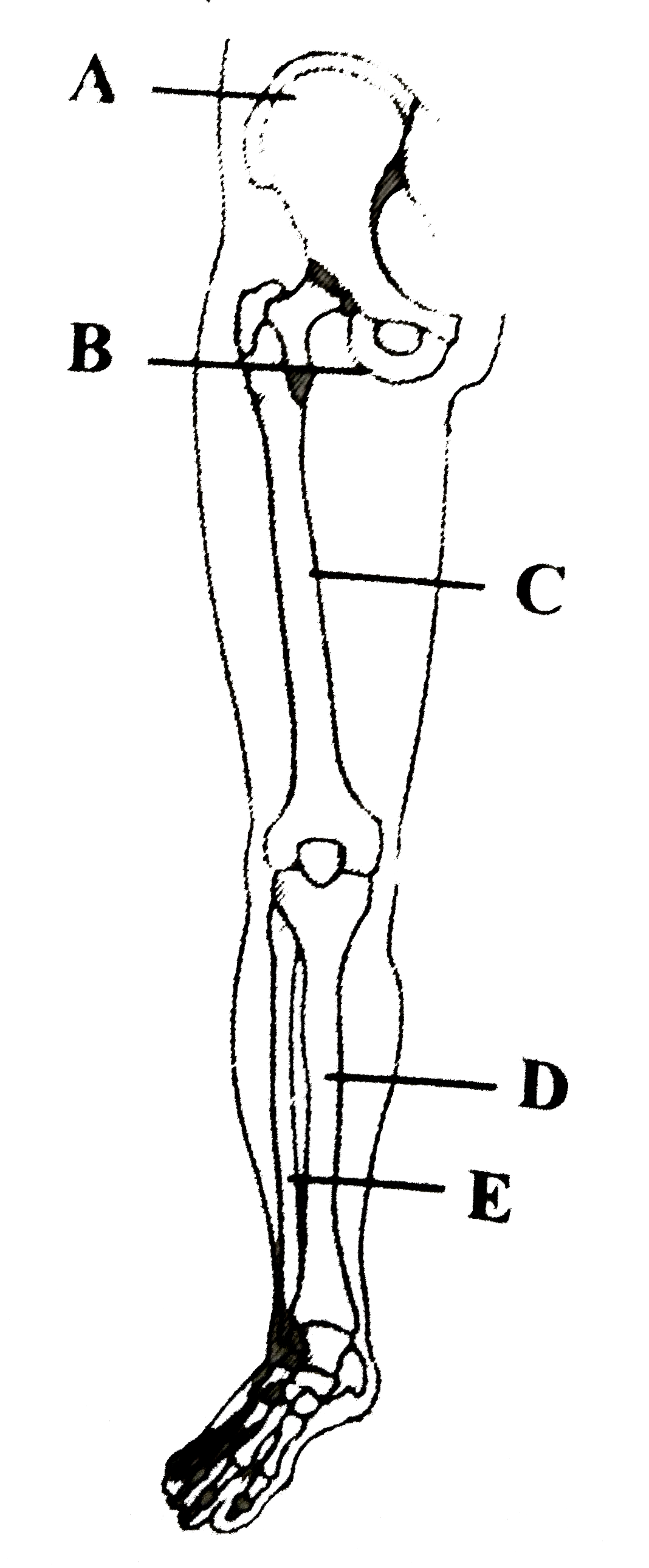
View SolutionWhich of the following statements are incorrect regarding a normal human ?
(i) The skull is dicondlic.
(ii) Metacarplas are are five in numbers.
(iii) Patella is a cup-shaped bone covering and protecting the posterior articular surface of the knee joint. (iv) Scapula is a large triangular flat bone, situated on the ventral side of the thorax.
(v) The pelvic girdle has two coxal bones.
View SolutionThe coxal bone of the pelvic girdle is formed by the fusion of
View SolutionA cricket player is fast chasing ball in the field.Which one of the following group of bones is directly contributing in this movement ?
View SolutionComplete the following paragraph by selecting the correct option
Pelvic girdle consists of two coxal bones. Each coxal bone is formed by the fusion of three bones (i) ,(ii) and (ii) . At the point of fusion of the above bones is a cavity called (iv) to which the thigh bone articultes. The two halves of the pelvic girdle meet ventrally to form the pubic symphysis containing (v) cartilage.
View SolutionMatch column I with column II and select the correct option from the codes given below.

View SolutionThe type of joint between the human skull bones is called
View SolutionWhich one of the following is correct description of a certain part of a normal human skeleton ?
View SolutionWhat is the name of joint between ribs and sternum ?
View SolutionSynovial joint is exemplified by
View SolutionThe joint of femur with pelvic girdle is
View SolutionThe joint of radio-ulna with the upper arm is
View SolutionRead the given statements and select the correct option.
Statement 1 : Articulation between the occipital condyles and the atlas vertebra forms a hinge joint.
Statement 2 : It permits the head to move in one plane only, i.e., nodding of head.
View SolutionWhich one of the following pairs of structures is correctly matched with their description?
View SolutionThe joint in which one of the two bones is fixed in its place and bears a peg like process over which the other bone rotates is called
View SolutionThe joints between the carpal bones are
View SolutionWhich of the following pairs is correctly matched ?
View SolutionMatch the two columns and select the correct option from the codes given below.
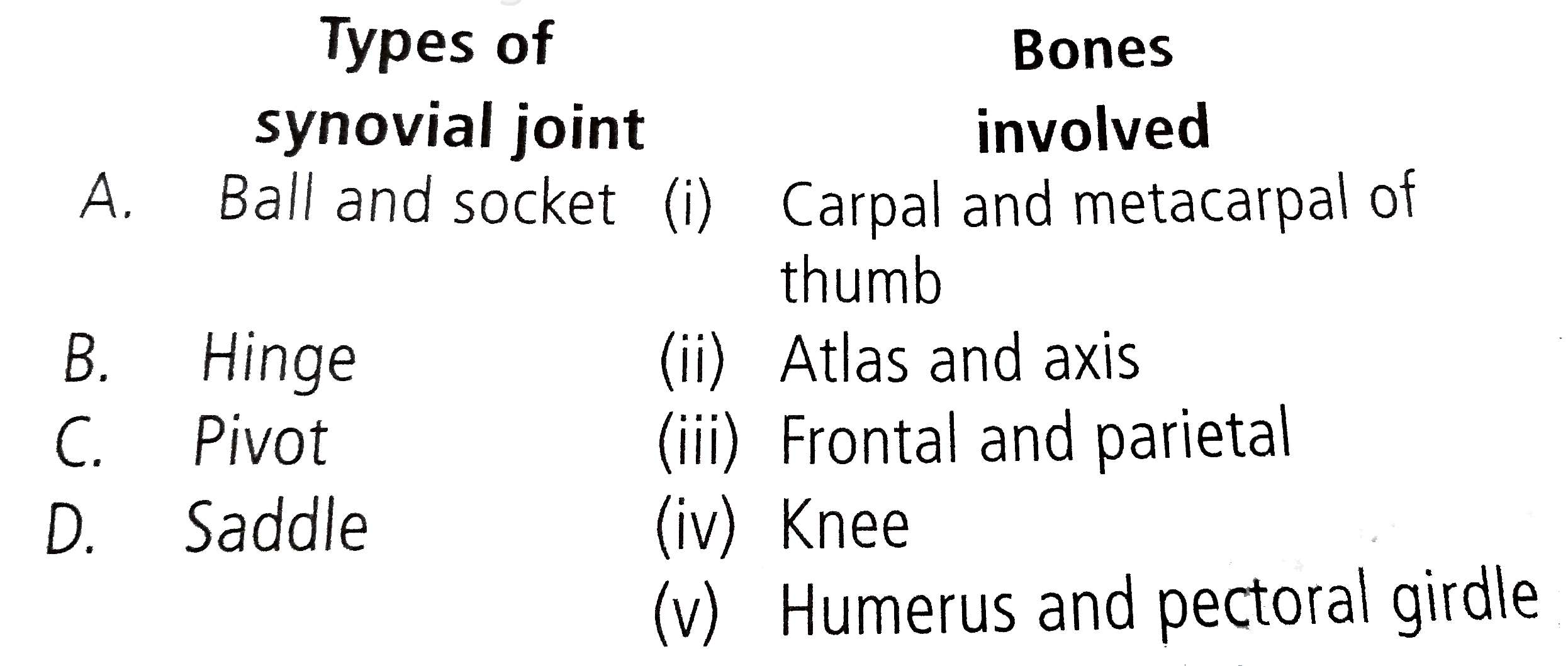
View SolutionWhich of the following is/are not correctly matched pairs?
(i) Ball and socket joint -Between humerus and pectoral girdle
(ii) Pivot joint - Between carpal and metacarpal
(iii) Saddle joint - Between atlas and axis
(iv) Gliding joint - Between the carpals
(v) Fibrous joint - In flat skull bones
View SolutionMatch column I with column II and select the correct option from the codes given below.
View Solution
Locomotion And Movement questions and complete solutions for chapter LOCOMOTION AND MOVEMENT of MTG BIOLOGY (HINGLISH) of Class 11